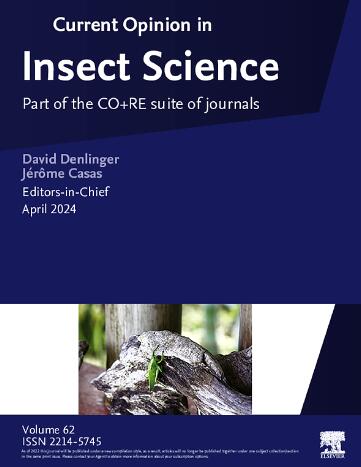Chromosomal rearrangements in mosquitoes: from micro- to macroevolution
IF 4.8
1区 农林科学
Q1 BIOLOGY
引用次数: 0
Abstract
Chromosomal rearrangements are believed to play a critical role in shaping the eco-evolutionary dynamics of diverse organisms, including mosquitoes. The availability of high-quality genome assemblies of multiple mosquito species has revolutionized the study of these rearrangements. Researchers can now employ genomic approaches to identify chromosomal rearrangements and gain new insights into their role in both microevolutionary and macroevolutionary processes. Autosomal inversions are emerging as possible key drivers of adaptation in mosquitoes. By maintaining standing genetic variation, inversions enable mosquito populations to rapidly adapt to environmental pressures, including insecticide-based vector control methods. X-chromosomal inversions may also play a role in speciation by reducing gene flow between diverging populations. Since mosquitoes are primary vectors of many human diseases, understanding the genomic basis of their adaptation and evolution is important from an epidemiological perspective. Studying chromosomal rearrangements can help identify chromosomal regions associated with adaptation to environmental stresses or insecticide resistance, thereby improving the efficacy of disease management programs.
蚊子的染色体重排:从微观到宏观进化。
染色体重排被认为在形成包括蚊子在内的多种生物的生态进化动力学中起着关键作用。多种蚊子的高质量基因组组装的可用性已经彻底改变了这些重排的研究。研究人员现在可以使用基因组方法来识别染色体重排,并对它们在微观进化和宏观进化过程中的作用有了新的认识。常染色体倒位可能是蚊子适应的关键驱动因素。通过保持现有的遗传变异,倒立使蚊子种群能够迅速适应环境压力,包括基于杀虫剂的病媒控制方法。x染色体倒位也可能通过减少不同种群之间的基因流动而在物种形成中发挥作用。由于蚊子是许多人类疾病的主要传播媒介,从流行病学的角度来看,了解蚊子适应和进化的基因组基础非常重要。研究染色体重排可以帮助鉴定与适应环境胁迫或杀虫剂抗性相关的染色体区域,从而提高疾病管理计划的功效。
本文章由计算机程序翻译,如有差异,请以英文原文为准。
求助全文
约1分钟内获得全文
求助全文
来源期刊

Current opinion in insect science
BIOLOGYECOLOGYENTOMOLOGY-ECOLOGY
CiteScore
10.40
自引率
1.90%
发文量
113
期刊介绍:
Current Opinion in Insect Science is a new systematic review journal that aims to provide specialists with a unique and educational platform to keep up–to–date with the expanding volume of information published in the field of Insect Science. As this is such a broad discipline, we have determined themed sections each of which is reviewed once a year.
The following 11 areas are covered by Current Opinion in Insect Science.
-Ecology
-Insect genomics
-Global Change Biology
-Molecular Physiology (Including Immunity)
-Pests and Resistance
-Parasites, Parasitoids and Biological Control
-Behavioural Ecology
-Development and Regulation
-Social Insects
-Neuroscience
-Vectors and Medical and Veterinary Entomology
There is also a section that changes every year to reflect hot topics in the field.
Section Editors, who are major authorities in their area, are appointed by the Editors of the journal. They divide their section into a number of topics, ensuring that the field is comprehensively covered and that all issues of current importance are emphasized. Section Editors commission articles from leading scientists on each topic that they have selected and the commissioned authors write short review articles in which they present recent developments in their subject, emphasizing the aspects that, in their opinion, are most important. In addition, they provide short annotations to the papers that they consider to be most interesting from all those published in their topic over the previous year.
 求助内容:
求助内容: 应助结果提醒方式:
应助结果提醒方式:


